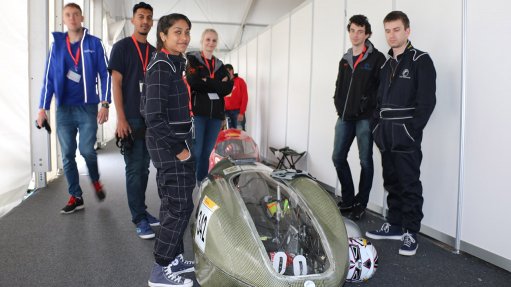
The University of Johannesburg (UJ) Voltronics team finished 15th at the Shell Eco-Marathon Europe, held in London, earlier this month.
The team’s prototype battery-electrical vehicle finished ahead of teams from France, the Netherlands, Ireland, Turkey and Spain.
The UJ team was the only African one to race officially. Teams from Tunisia, Morocca and Nigeria registered for the event, but did not post valid racing results, or did not pass technical inspection.
The race driver was a female engineering student from UJ, Shalaka Thomas.
The team consisted of eight engineering students from the university, accompanied by a team mentor and mechanical engineer.
The Shell Eco-Marathon Europe requires students to use renewable and nonrenewable resources to design, manufacture and build a car for future transportation that will be highly fuel-efficient.
Fifty teams registered to compete in the race’s prototype category, with the energy source an electrical battery. Of those, 45 teams passed technical inspection and 30 teams registered valid racing results in London.
“The UJ team’s first generation electrical vehicle was very efficient already – that car did 140 km/kWh, meaning it could drive 140 km on just one kilowatt of electricity, about the same power as using a microwave on medium for an hour,” says UJ Department of Electrical and Electronic Engineering Science senior lecturer Dr Yuko Roodt.
“That vehicle won the 2014 African Shell Eco-Marathon at the Kyalami Raceway, near Johannesburg. In 2015, the team built their second-generation electric vehicle and won the South African Shell Eco-Marathon for the second time at Zwartkops. They got a result of 343.8 km/kWh, doubling their performance in a single year. That result placed the UJ team amongst the top teams internationally.”
The 32 kg UJ vehicle – dubbed Nightfury – achieved a best racing result of 309 km/kWh in the Shell Eco-Marathon Europe.
Each team was allowed four attempts during the competition.
Each attempt consisted of eight laps of 2.215 km that had to be completed in under 43 minutes with the best possible energy or fuel economy.
The best attempt counted for the final result.
The UJ team says it is pleased with their vehicle’s results, and believes the event will help them prepare and improve their vehicle for the African Shell Eco-Marathon race, to be held in August.
“The race was intimidating, because the other teams have been racing for longer,” notes Thomas.
“It was a lot of fun too, driving a tiny car going quite fast.
“The car is so tiny and you are strapped down – you are almost in a sleeping position driving it. That is not ideal for driving, but it is the most energy efficient.”
Thomas is studying B Ing Electric and Electronic Engineering.
Her previous racing experience includes driving go-carts and PlayStation games, including one that had a simulation of the London racing track.
“The Shell Eco-Marathon Europe gave the team world-class experience,” says team leader and project manager Pieter Erasmus.
“We plan to improve on better visibility for the driver and driver comfort for the African Shell Eco-Marathon later this year.”
“A project like this provides students with the opportunity to learn and work on an intricate and complex project with many aspects, from communication, administration, logistics, design, development, integration [to] testing,” adds Roodt.
“This was the culmination of all their studies. The marathon really tested their engineering skills and ability to innovate.”
The team consisted of Reginald Masher, Paul Lee, Nicholas Harvey, Dr Yuko Roodt, Marissa Erasmus, Pieter Erasmus, Eduard Basson, Shalaka Thomas and Ryan Coetzee.